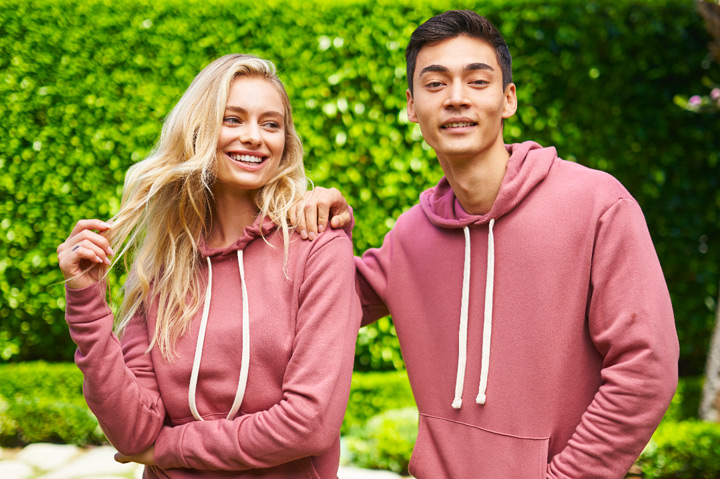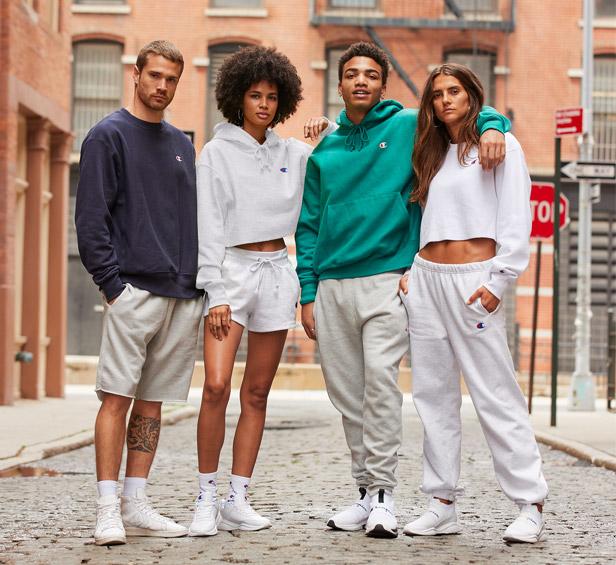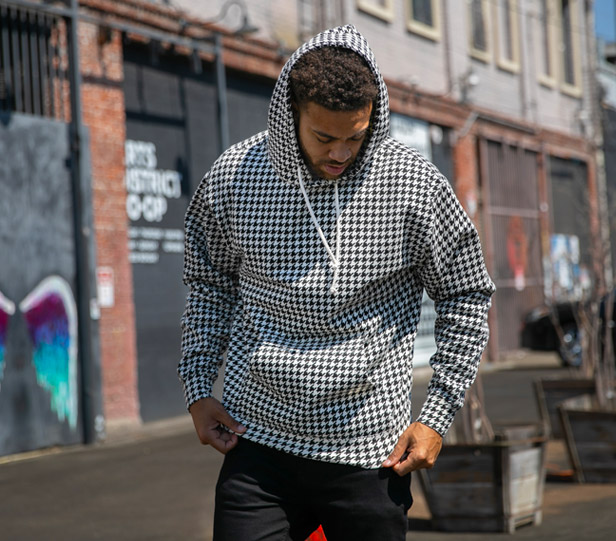November 30, 2021
Hoodies Are Fashion Heavyweights
Cozy yet durable, hooded sweatshirts are making the transition from a pandemic staple to updated office casual.
In some parts of Canada, they call a hooded sweatshirt a “bunny hug,” and there’s no denying the cozy comfort of an oversized hoodie in a heavyweight fleece fabric.
It’s almost like “wearing a weighted blanked,” says Caius Olowu, director of merchandise and design at Top 40 supplier Next Level Apparel (asi/73867). “Heavier fabrics hold their structure in a relaxed cut, whilst also providing the wearer a sense of comfort and protection.”

The unisex Santa Cruz fleece hoodie (9303) from Next Level Apparel features a heavy cotton face for ease of printability and breathability.
Thanks to the influence of streetwear in fashion and a sustained nostalgia for ’90s-era silhouettes, oversized unisex hoodies have been popular with younger consumers for a while now. But the pandemic broadened their appeal, with the desire for comfort turning sweats into the de facto work-from-home uniform. “Research shows that 60% of men feel that wearing a hoodie is appropriate when working from home,” says Michael Johnson, printwear director at Hanesbrands (asi/59528).
The trend seems poised to outlast the pandemic. “As people return to work, some offices are adopting what Silicon Valley execs embraced years ago, the hoodie, specifically the Champion hoodie,” Johnson says. “In other words, grownups are catching up to what high school kids have known for years.”
Cary Heller, vice president of sales at Keego Harbor, MI-based All USA Clothing (asi/30171), believes the trend has an element of sustainability to it as well. “People don’t want the tri-blends,” he says. “They want chunky T-shirts and stubbornly tough hoodies that are going to last a long, long time.”

Hanesbrands has expanded its Reverse Weave collection, building on the enduring popularity of its Champion Reverse Weave hoodie. Sweatpants, joggers and crop pullover hoodies are also part of the collection.
Fabric weight is a measurement of the thickness of the threads that make up the material, and heavyweight hoodies are typically made from cotton that ranges from around 10 to 13 ounces. The Champion Reverse Weave, for example, a campus staple for more than 80 years, weighs in at 12 ounces.
Look for retail-ready finishes that elevate hoodies, whether it’s dyed-to-match drawcords, overlap neck stitching, double-stitched seams or even fleece-lined hoods for added warmth. “The hoodie should be able to stand on its own as a blank, even in a nice retail setting,” Olowu says. “The designs, prints and branding that are added should be the cherry on top.”

This Independent Trading Co. heavyweight hoodie (IND4000), available from S&S Activewear, comes in a wide range of colors and patterns, including a bold houndstooth print.
Garment-dye treatments that give the hoodie a vintage look and tie-dye continue to be in demand, according to Johnson. Basic colors like gray, navy and black are top performers in the promo industry, according to Christina Marcantelli, sales enablement coordinator at Top 40 supplier S&S Activewear (asi/84358). Still, she adds, there are so many colors and patterns to choose from for end-buyers looking for something a little different. And “alternative neutrals” like cream or off-white, sandstone, khaki and army green are also growing in popularity, she adds.
When it comes to decoration, hoodies – particularly those with a 100% cotton face – offer a versatile canvas. “Because the fabric is heavier and thicker than a T-shirt, it lends itself to printing as well as larger embroidery projects,” Johnson says. “The thicker fabric helps to stabilize the embroidery, which will help minimize puckering and maintain registration. The smooth surface is also ideal for smaller details, such as small text.”
Olowu recommends experimenting with heavier print techniques that won’t work well on a tee. “A great option is a puff print,” he notes. “Puff prints usually aren’t as light and flexible as you would want, but the added hand feel and dimension complements a heavier-weight garment.”

Product Hub
Find the latest in quality products, must-know trends and fresh ideas for upcoming end-buyer campaigns.
